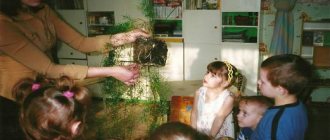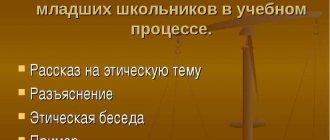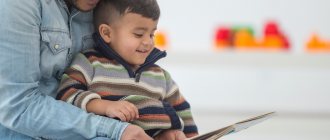The concept and content of spiritual and moral education
Definition 1
Spiritual and moral education is a purposefully organized pedagogical process of assimilation and acceptance by students of cultural, spiritual and moral values.
The essence of spiritual and moral education lies in the consistent expansion and strengthening of the value sphere of the child’s personality, the formation of his ability to find, see, perceive and evaluate beauty on the basis of cultural and moral norms and traditions.
Main directions of spiritual and moral education:
- Fostering love for the Motherland, developing patriotism, respect for the rights and freedom of every person.
- Education of aesthetic consciousness and moral feelings.
- Fostering hard work, a positive attitude towards work, learning and life.
- Formation and development of a value-based attitude towards a healthy lifestyle, one’s health, love and respect for family, nurturing family values.
- Fostering a respectful and valuable attitude towards the surrounding world, nature, and native land.
- Cultivating a value-based attitude towards aesthetically beautiful things, forming ideas about ideals and values.
Are you an expert in this subject area? We invite you to become the author of the Directory Working Conditions
Principles of spiritual and moral education:
- the principle of personal moral example;
- the principle of socio-pedagogical partnership between all participants in the educational process;
- the principle of individuality in education;
- the principle of integration of educational programs;
- the principle of relevance and relevance of education.
The importance of moral education for society
The moral situation of many families and society as a whole leaves much to be desired. The characteristic reasons for this situation include the lack of constant cultural and leisure work, the healthy physical training of young people is being replaced by the pseudoscience of safe sex, there is no patriotic education at school, and state policy is likely to destroy the valuable pedagogical experience accumulated over decades.
The processes are intensified by a powerful stream of propaganda of violence, debauchery, and alcohol, with the complete absence of government and law enforcement agencies of effective methods to change the situation.
In the modern education system, extremely little attention is paid to spiritual and moral development. The salvation for the country should be the restoration of scientific, artistic, traditional religious culture. Harmony and beauty, built on Orthodox Christian principles, are the main lever in overcoming the crisis in education, culture, and the inner world of a person.
The main criteria for judging the moral education of children can be:
- pride in one's homeland;
- the ability to be useful and serve oneself;
- desire for good relationships, love of reading, work;
- the ability to choose friends and not let loved ones down;
- a critical attitude towards one's shortcomings;
- the desire to preserve social values and native nature;
- assistance to loved ones, comrades, disabled people;
- creative attitude to study and independent work, participation in social events.
Spiritual and moral education of the 17th – early 20th centuries
The era of Peter the Great (1682-1725) changed views on education. In a relatively short period of time, the foundations of a national education system were created in Russia. Before Peter I in Russia, a person was assessed by belonging to one or another class; under Peter I, personal achievements and services to the Fatherland became significant for the first time.
During the era of Peter I, new ideological guidelines began to form in society. Teaching etiquette, foreign languages, and familiarity with Western European fashion influenced the lives and consciousness of people. The worship of everything “foreign” could not but influence the change in approaches to the education and training of young people. In the XVIII. Century in Russia the first educational associations are formed. In the 19th century, various pedagogical projects for the creative, free education of the younger generation were implemented.
The experience of family education became the soil on which the first pedagogical theories “grew”. At first, they did not emphasize the specifics of family upbringing, but used the experience of family upbringing to draw general pedagogical conclusions.
With the advent of public education, the problem of the relationship between family and school in the overall process of education arose. It was solved in different ways - depending on the dominant social system, the philosophical and socio-political views of the thinker or practical teacher. Thus, according to Quintilian, the theorist of oratory in Ancient Rome, public (school) education has more advantages compared to individual (home) education. He wrote: “He who was brought up in solitude will be blinded by the bright shine of the sun and will not find any news for himself when he enters life with his knowledge.”
He identified four stages of development of the new generation (infancy, adolescence, youth and manhood) and outlined a six-year period of education (six-year school) for each stage; he said that a child's school is a mother's school in every family. Ya.A. Comenius put forward a system of ideas related to the recognition of the great gifts in the child’s nature: the natural attraction to light, to knowledge, to goodness, and defined the role of education as helping the child in the process of growing up. This desire to penetrate into the nature of the child was expressed by him in his definition of the principle of “naturalness.”
The 17th-century English philosopher Locke was a staunch supporter of individual education in the family under the guidance of governesses. The main goal of education, according to Locke, is virtue, the education of a moral person. But this cannot be achieved in school: School is a “branch of society,” and society is such that it educates immoral people. Therefore, Locke resolutely insists that education does not take place in school, but in the family, where an intelligent and virtuous teacher can raise the same “gentleman.” This argument is Locke's sober assessment of modern society and the utopian dream of raising moral people in an immoral society. Locke's pedagogical ideas about revealing the child's natural abilities had a great influence on the history of pedagogical thought. For him, a child is like a blank slate, that is, a child can perceive everything that experience brings. From these thoughts, as a consequence, arose the belief in the exclusive influence of the Lockean school.
Activities for spiritual and moral education in elementary school
It is better to divide the activities into subgroups:
Cognition
This includes various intellectual games and work on filling out rating tables. Children need conversations aimed at stimulating interest in learning on the following topics: “What is not written in the textbook,” “Outstanding women scientists,” “About people of science.”
The main thing is not to put pressure on children, but to develop in them an interest in learning and a desire to develop.
Value guidelines
Boring classroom hours and dry conversations will not be able to provide proper patriotic education and will not teach the basics of etiquette. Virtual travel and online games are much more interesting and educational.
It is useful for children to hear true stories about patriotic deeds from veterans. The rules of etiquette are reinforced under the control of the class teacher during lunch, extracurricular activities with access to the city or nature.
Necessity of labor
Awareness of the importance of work is instilled in children during short shifts, general cleaning of the classroom, and school grounds. Additional help will include classes on the topic of vocation, choosing a future profession, visiting a local factory, organizing a school fair.
Public benefit
This group of conversations and activities aims to help every student realize that he should be useful to someone in real life. This could be patronage of younger schoolchildren, a rabbit, a kitten. With their class teacher, children visit shelters, orphanages, and hospitals.
Entertaining children, telling them a fairy tale, helping a sick person with lunch - these activities not only cultivate compassion, but become a decisive factor in choosing a future profession.
Creative activities
Trips to their native land, places of battle, themed evenings on the theme of the arrival of autumn, Maslenitsa, fashion shows, meetings with poets and composers develop students’ interest in creative pursuits.
Future creators will gain self-confidence from the genuine interest of others in their creations. It is important for a child to express admiration; excessive criticism or ignorance destroys the desire to draw or perform in a drama club.
Health promotion
Regular sports competitions and classes on the rules of maintaining health are a useful endeavor. To make it interesting for children to take part in games, trips to health camps, and hikes, props and posters are carefully prepared for them, and comparative diagnostics of health indicators “before” and “after” are carried out.
The free time of younger schoolchildren can be devoted to classes in thematic clubs and sports sections. For unobtrusive control, teachers can use a survey or discussion method. Only here it is important that such a “conversation” does not turn into a teacher’s monologue or a conversation exclusively among children.
Spiritual and moral development of the child’s personality
Spiritual and moral development of the child’s personality
In accordance with the “Concept of spiritual and moral development and education of the personality of a citizen of Russia,” one of the main tasks of modern Russian education is to ensure the spiritual and moral development of the child’s personality.
Morality, which has spirituality as its source, is not just formed, it is nurtured from an early age. School age is the most susceptible to emotional, value, spiritual and moral development, and civic education. This deficiency will be difficult to make up for in subsequent years.
To develop a sense of morality, patriotism, and spirituality, it is very important to give children basic knowledge about the Motherland. But at the same time, do not forget that knowledge itself is the food of the mind, and patriotism does not come from the mind, it comes only from the heart. During its thousand-year formation, our tradition has absorbed everything reasonable, good, and eternal that has been created over the centuries. Therefore, priority should be given to spiritual and moral education based on knowledge of the traditions, culture, history of one’s ancestors, not excluding the combination of culture and traditions of Orthodoxy, since the history of our Fatherland is inextricably linked with Orthodoxy.
In our school, for several years, one of the areas of extracurricular activities has been general cultural activities. Within the framework of this direction, the course “Spiritual Heritage” has been developed and is being taught. The goal of the program is the spiritual and moral education of students, creating conditions for the formation and development of an integral personality with rich spiritual, social and moral potential, a citizen and patriot of their homeland.
Tasks:
• formation of patriotic feelings and consciousness of students based on the historical values of Russia;
• maintaining and developing a sense of pride in one’s people, country, region, family;
• spiritual and moral education of children based on the combination of culture and traditions of Orthodoxy;
• introducing schoolchildren to the spiritual, moral, cultural values of their people;
• formation of respect for the traditions and symbols of the Russian state, a sense of love for nature.
• revival of the spiritual and moral traditions of the family;
• fostering a sense of honor, dignity, duty, nobility;
• development of cognitive interests, needs for knowledge of the cultural and historical values of the country, region, city;
• fostering an ethic of friendly attitude towards people of other nationalities;
• fostering collectivism and responsibility;
• promotion of healthy lifestyles.
The sections of the “Spiritual Heritage” course program are as follows:
- Peace of your soul
- Natural world
- World of feelings
- World of communication
- A man among people.
While working on the section “The World of Your Soul”, an idea of spiritual treasures is given: pure thoughts, good deeds, faith, hope, love, compassion, the desire for perfection.
In the “Natural World” section, based on expanding children’s ideas about the signs, wonders, and events of each season, they show what each season can teach a person; faith in goodness, friendship, love is affirmed; it is determined what or who helps a person to believe in love and goodness. Issues discussed:
- what gifts does the Earth bring?
— what a person can do for the Earth;
- what the Earth can do for humans.
The section “The World of Senses” introduces the concept of “nobility”. Students determine what life on earth would be like if there were more noble people. Problems discussed:
— What is needed in order for such a quality as kindness to develop?
—Can kindness heal a person?
— Why is a cup of water larger than the sea?
— What is charity?
— Is it worth helping needy, sick and unhappy people?
— If you don’t have money or extra things, how can you help other people?
The “World of Communication” section allows you to learn how to find friends, explain what a person needs in order to be respected and want to communicate with him. Students write advice for a person who wants to have friends but cannot find them. In the classes of this section, children learn to know themselves and their moral qualities.
The classes in the “Man Among People” section are designed to teach children the rules of communication in different places.
Conducting extracurricular activities involves both theoretical presentation of material (verbal methods) with demonstration of antiques, reproductions, visits to exhibitions, museums, and practical activity, which is the main one necessary for consolidating information in the form of classes in stage speech, decorative and applied arts (acquaintance with crafts), vocal and choral work, learning folk games, songs, dances.
Here are examples of some types of work used in the classes of this course:
- a description of the meekest person in the class, without mentioning his name;
— definition of the meaning of the words “happiness”, “friendship”;
- drawing a flower of happiness;
- image of “shining friendship”;
- description of the happiest day in life;
— discussion of the question “What does a person need to be respected?”;
— compiling a list of basic rules of respect, rules of communication, rules of behavior;
— conducting games: “Chain of good goals”, “What helps the soul grow”, etc.;
— holding holidays together with parents;
— participation in school holidays (“Christmastide”, “Maslenitsa”, “Meeting of Birds”, etc.);
— congratulations to WWII veterans, home front workers on Defenders of the Fatherland Day, Victory Day;
— patronage assistance to elderly people.
Joint preparation for calendar holidays is carried out on the principle of cooperation between children, parents and teachers. The process is managed through the creation of conditions, the realization of children’s creative potential, independent activity, and the acquisition of skills and abilities. In this case, one should take into account the desire and craving of each participant in the holiday, his psychological mood.
During the “Spiritual Heritage” course, the tradition of tea drinking is introduced as an expression of the tradition of Russian hospitality, which is held after festive gatherings. During tea drinking, children develop self-service skills (setting the table, cleaning the table after tea drinking), cultural behavior at the table, and discuss team problems. Tea drinking brings children and their parents closer together, making them one family.
Spiritual and moral education chastely and unobtrusively prepares boys as protector men, and girls as mothers. It creates in children an awareness of their belonging not only to family, class and school, but also to communities of higher orders (city, people). This sense of belonging is the basis of future patriotism.
Children is our future. But they are also our present. Not only their well-being, but also the health of our society depends on how our children grow up.
Historical aspects of spiritual and moral pedagogy
The development and establishment of the education system in any state is closely connected with its history. Historical periods in the development of states are characterized by certain views on the education and upbringing of children, the possibilities of the educational process, the needs of society for educated and trained people, and, finally, the state of the state education system.
Analysis of historical and archival documents, legal documents in the field of education, regulatory, journalistic and artistic sources allows us to talk about family and home education as a complex educational process determined by the changing social, sociocultural and economic situation in the country.
Since ancient times, people have created their own pedagogy, preparing children for practical activities, for the struggle of life with the help of a variety of educational means.
With the advent of the family, family education became practically the only form of education for children in society for many millennia; schools and other educational institutions were few in number and served a small proportion of children, mainly from the privileged classes. The class character of society determined the different content and direction of family education in different social groups.
In the education system developed in Athens in the 7th-5th centuries. Century BC family upbringing and education took a dominant position. Unlike the Spartan education system, which was state-owned, in Athens children under 7 years of age were in the sphere of family education. For girls, in accordance with the position of women in a slave society, there was only a home education system. In addition to the traditional basics of literacy (reading, writing, counting), they were taught to play musical instruments, home economics, needlework and sewing.
Many principles of the Spartan and Athenian educational systems were further developed in Rome (6th century BC). As in Athens, boys were raised and educated until the age of 7, and girls even later, under the supervision of their mother or older relatives, who were responsible for their education. From the age of 7, boys began to study, usually under the supervision of their fathers. Education had a purely practical purpose - to prepare the child for social, military and economic activities in those forms that were dictated by the social status of the family. Thus, in addition to reading, writing and arithmetic, which were taught to everyone, the son of an artisan or peasant was prepared to work on his father’s farm; the son of an aristocrat learned to wield weapons, swim, ride a horse, learned something about the management of Ancient Rome and learned to manage agricultural work on his father’s estate. The main feature of Roman education and upbringing was its pronounced civic character. The main goal was to educate an active member of society, capable of sacrificing himself for the sake of family and state, a brave soldier who despises everything foreign, a skillful politician and a prudent landowner. In subsequent centuries, this system was largely preserved, only a few changes were made: The education of children began to be entrusted to slaves, and specially invited teachers were involved in their upbringing.
Family is one of the main themes of ancient Russian literary and pedagogical monuments of the 14th century. and domestic collections of the 14th century. The pedagogical thought of Ancient Rus' was clearly manifested in the “Instructions for Children” by Prince Vladimir Monomakh, in such literary and written monuments as “Bee”, “Prologues”, “Chrysostom”, etc. In the understanding of ancient Russian authors, the true wisdom of family education is associated with high morality, with Christian virtues.




